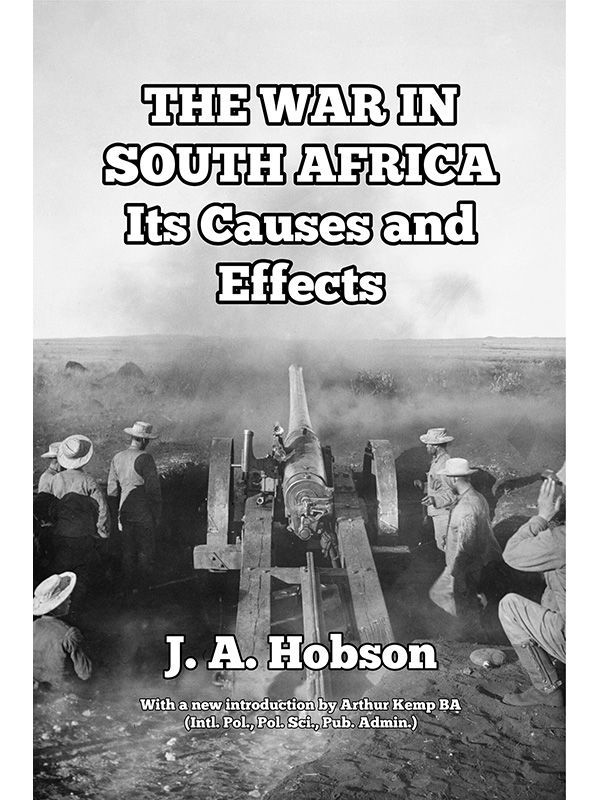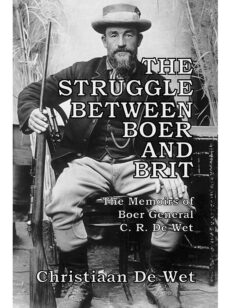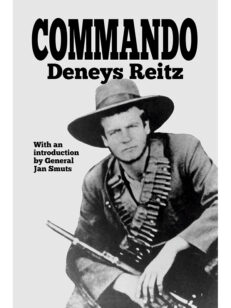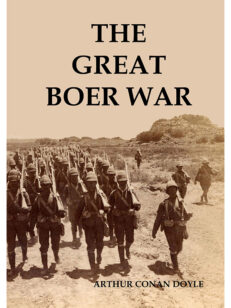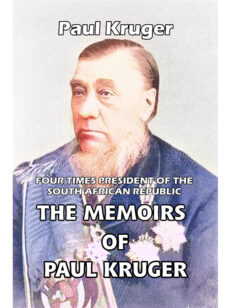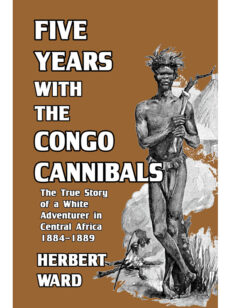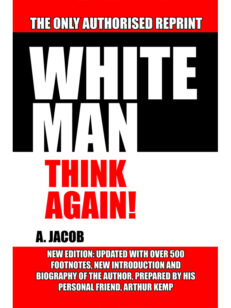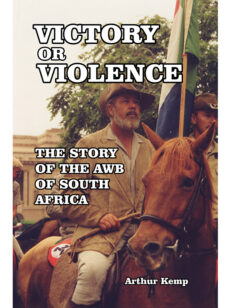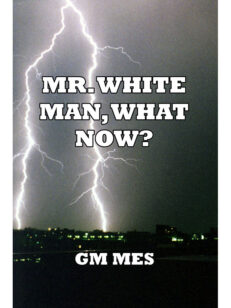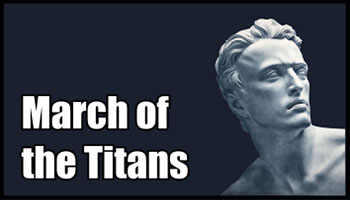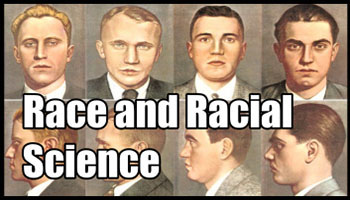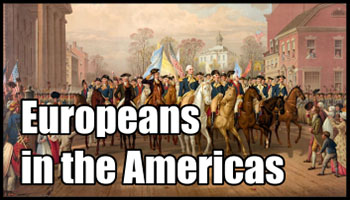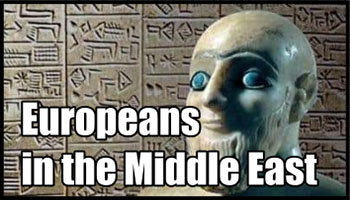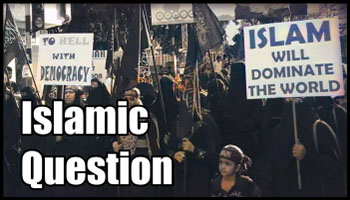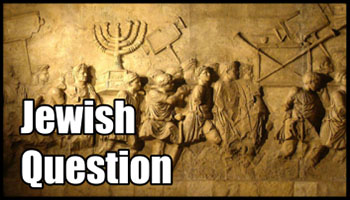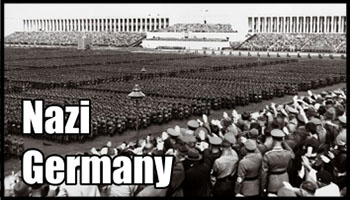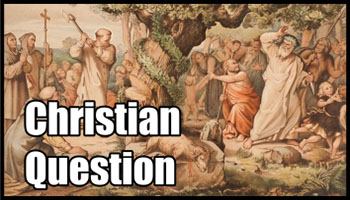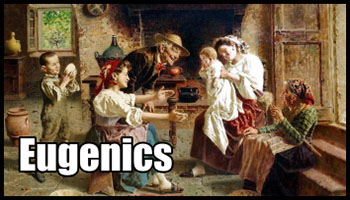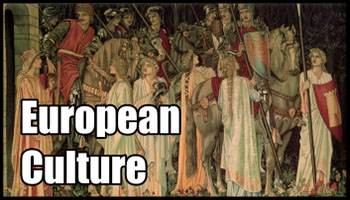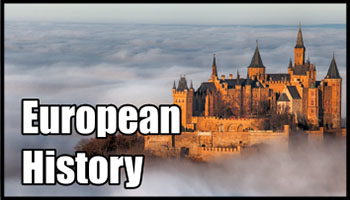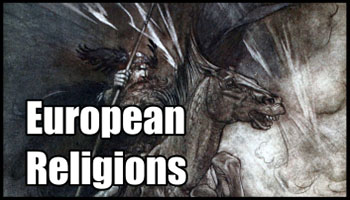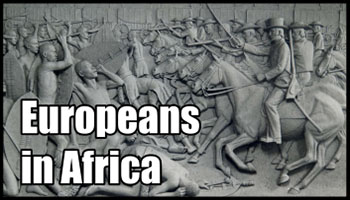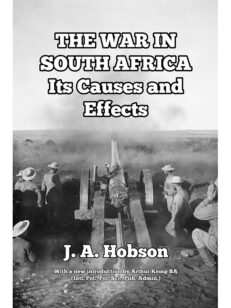Description
By J. A. Hobson. With new introduction “South Africa 1899, Iraq 2003: The Awful Parallels” by Arthur Kemp BA (Intl. Pol., Pol. Sci., Pub. Admin.). John Atkinson Hobson’s prophetic book, first published in 1900, describes in clinical detail the lies, deception, underhanded maneuverings, false propaganda—and the ubiquitous Jewish lobby—which lay behind the outbreak of the Second Anglo-Boer War in 1889.
Hobson’s book reveals the trail of lies in the build-up to that war. These included faked “atrocity” propaganda, faked allegations of Boer barbarity, corruption, maladministration, and the deliberate distortions and double-crossing in the “negotiations” which preceded the war.
Hobson even shows how the lies also included fake stories of “Boer armament build-ups” which were portrayed as evidence of the “Boer threat” to British interests.
He also spends time explaining how these allegations were spread across the English-speaking world. They were generated, he proves, in the newsrooms of the anti-Boer “newspapers” in Johannesburg, and sent by telex to London, from where they were fed into the major English language newspapers, conservative and liberal-aligned alike, where they were faithfully repeated without question.
In this way, Hobson proves, an atmosphere of hatred against the Boer Republics was engendered, and the British public were incited into supporting armed intervention in a nation on another continent which posed no threat to Britain at all.
Finally, Hobson reveals the true source behind the anti-Boer agitation and incitement to war: the powerful Jewish lobby in South Africa, who he openly calls the “Jew-Imperialists.”
This Jewish lobby, Hobson shows, owned not only the mineral and trading wealth of the Transvaal Boer republic, but also the major media outlets in Johannesburg, which generated the false propaganda against Paul Kruger’s isolated and ultimately inoffensive state.
“A few of the financial pioneers in South Africa have been Englishmen, like Messrs. Rhodes and Rudd; but recent developments of Transvaal gold-mining have thrown the economic resources of the country more and more into the hands of a small group of international financiers, chiefly German in origin and Jewish in race.
“Before I went there, the names of Beit, Eckstein, Barnato, &c., were of course not unknown to me; the very ship in which I crossed bore many scores of Jewish women and children. But until I came to examine closely the structure of industry and society upon the Rand I had no conception of their number or their power. I thus discovered that not Hamburg, not Vienna, not Frankfort, but Johannesburg is the New Jerusalem.
“It is not too much to say that this little ring of international financiers already controls the most valuable economic resources of the Transvaal. The first and incomparably the most important industry, the gold-mines of the Rand, are almost entirely in their hands.
“When it is borne in mind that this great confederation of press interests is financially cemented by the fact that Rand mining magnates are chief owners of at least two important London daily papers and of several considerable weekly papers, while the wider and ever-growing Jewish control of other organs of the press warrants a suspicion that the direct economic nexus between the English press and Rand finance is far stronger than is actually known, we shall have a clear comprehension of the press conspiracy which has successfully exploited the stupid Jingoism of the British public for its clearly conceived economic ends.”
Hobson also provides the casus belli why this Jewish lobby wanted the war: not to seize the mineral wealth of the Boer republic (they already owned that) but to ensure that its political masters were brought under control to ensure a steady cheap supply of black—and white—labor to toil in the dark mines.
He is also biting about South Africa’s racial policies, pointing out that the reliance on nonwhite labor would ultimately cause the death of white rule in that country:
“The presence of large supplies of available Kaffirs has simply converted the entire white population into a parasitic class living upon black labour by methods which resolve themselves, when properly considered, into ‘force.’
“The fact is, that South Africa is not in any true sense a white man’s country, for though white men live they do not work there save in the capacity of overseers of serf-labour. No satisfactory civilisation can possibly arise where two races live together without blending, one superior in cerebral development and using this superiority to impose all the burden of directly productive labour upon the other, while it despises this inferiority.
“This essentially parasitic life visibly impairs the moral fibre of the white peoples, and inevitably tends to the mental and even physical degeneracy which develops in all slave-owning communities.”
This book, first published by MacMillan in New York and London as the Second Anglo-Boer war was already underway, was highly popular, but its open naming of the Jewish Randlords as the source of the lies and agitation raised an outcry from those so named, and the work quickly disappeared down the memory hole.
This brand-new edition has been completely reset and updated with annotations to inform present-day readers of all references to persons and events mentioned in the book. In addition, it also contains a new short history of the course of the Second Anglo-Boer war as a backgrounder.
Finally, it contains a brand new introduction “South Africa 1899, Iraq 2003: The Awful Parallels” by Arthur Kemp, which details the Jewish lobby’s role in inciting the Iraq War, using forgery, lies, deception and mass media—following the exact pattern used in the run-up to the Boer War.
Fully annotated and indexed.
Contents
South Africa 1899, Iraq 2003: The Awful Parallels — Introduction to the 2013 edition by Arthur Kemp
The Second Anglo-Boer War: A Potted History
Author’s Preface (1900)
Map of South Africa Prior to the War
PART I: The Boer Republics in 1899
Chapter I: Political Position in the Cape Colony
Chapter II: Johannesburg in the Summer of 1899
Chapter III: Personages and Parties in the Transvaal
Chapter IV: The Personality of President Kruger
Chapter V: Other Forces in Transvaal Politics
Chapter VI: The War Spirit in Pretoria
Chapter VII: The Race Conflict in South Africa
Chapter VIII: The Helots in Johannesburg
Chapter IX: The Demand for the Franchise
Chapter X: Official Corruption and Incompetency
Chapter XI: The Need of Financial Reform
Chapter XII: The Dynamite Monopoly
Chapter XIII: A General Estimate of Grievances
Chapter XIV: The Alleged Dutch Conspiracy
Chapter XV: The Dutch Feeling in the Colony: An Interview with Olive Schreiner
Chapter XVI: Transvaal Armaments
Chapter XVII: The Case of the Free State
Chapter XVIII: The Suzerainty Issue
Chapter XIX: Why Did the Boers Issue the Ultimatum?
Chapter XX: Diplomacy Leading Up to the War
PART II: The Policy of Rand Capitalists
Chapter I: For Whom are we Fighting?
Chapter II: The Political Methods of the Outlanders
Chapter III: A Chartered Press
Chapter IV: For What are We Fighting?
PART III: Towards a Settlement
Chapter I: Dutch and British in South Africa
Chapter II: The Agricultural Outlook
Chapter III: The Probable Industrial Future of South Africa
Chapter IV: The Natives in South Africa
Chapter V: Federation of States
Chapter VI: The True Line of British Policy
Index
292 pages. Paperback.

